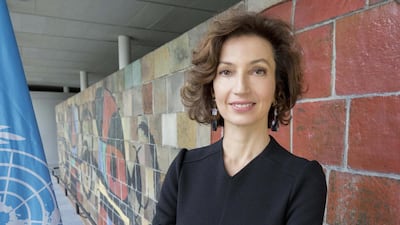A new study will be launched to analyse the impact of the pandemic on global cultural sectors. The news was announced on the opening day of the Cultural Summit Abu Dhabi on Monday.
Held online until Wednesday, and organised by the Department of Culture and Tourism – Abu Dhabi (DCT Abu Dhabi), the annual event bring global experts in the fields of design, heritage, media, public policy, technology and business for a series of speeches, panel discussions, case studies, artist talks and performances.
In her keynote address, Unesco director general Audrey Azoulay said the agency teamed up with DCT Abu Dhabi for a wide-ranging investigation of Covid-19's damage to the industry and to outline measures for its recovery.
“We first need to understand it, to measure it. This is an essential step because in many respects, the scope of the crisis makes it difficult to quantify,” she said.
“And that's why we decided to launch with the Abu Dhabi Department of Culture and Tourism, a global study on the impact of the Covid-19 pandemic on the cultural economy.”
Azoulay laid out in stark terms how the cultural sector has been haemorrhaging financially and creatively owing to social restrictions caused by the pandemic.
"We need culture more than ever, and at the same time, culture needs us more than ever because the entire sector is suffering. Following the closure of concert halls, theatres, bookstores, cinemas, the royalties collected by creators could have dropped by 35 per cent in 2020, that's €3.5 billion loss globally," she said.
“And indeed culture is probably one of the sectors most effected by Covid-19 – maybe the most after the airline industry – and behind these figures, there are millions of disrupted lives with many professionals left to fend for themselves.”
While the damage is all too real, Azoulay said the cultural sector’s contribution should not only be viewed through an economic framework.
The lack of a functioning arts industry carries significant societal effects.
"Recovery is therefore an anthropological and economy necessity," she said. "Its impact and influence are often underestimated. It is also a necessity for peace because culture brings people together closer by building bridges and by creating meaning for all these reasons.”
The case for culture
It is a sentiment echoed by DCT Abu Dhabi chairman Mohamed Khalifa Al Mubarak.
In his summit address, he highlighted the mental health crisis caused by a lack of exposure to arts and cultural experiences.
"We are understanding collectively, more than ever, that culture is a solution for humanity," he said.
"During this pandemic we saw first-hand the effect on mental health. It has been quite devastating and the lasting impressions on this will last for a long time. The medicine for this is culture."
Al Mubarak finished his speech by challenging attendees to make a more vigorous case for the importance of culture.
“Can we create a new value proposition for culture? A proposition that communicates how central culture is in responding to our new realities?" he said.
"This pandemic will eventually be over and we just need to make sure, right now, the building blocks that maybe in the past were not set as strong as they should, can now be set in stone.
“This is not for ourselves but for future generations and to make sure the problems we have faced, they will never face.”
Culture Summit Abu Dhabi runs until Wednesday. Attendance is free and open to the public. Registration is live on the website.


